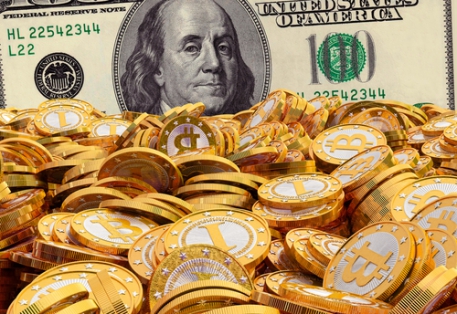Let’s take a look at the smoke and mirrors.
When you want to buy a sofa listed for $500 on Overstock.com you can press the Bitcoin button, which is right below the PayPal button on the right hand side. To pay with the Bitcoin button you need a Coinbase wallet. When you use your Coinbase wallet to pay for $500 with bitcoin, Coinbase doesn’t actually give Overstock.com bitcoins. Coinbase converts the bitcoins in your wallet to dollars and gives Overstock.com the dollars. In fact, one of the services Coinbase is providing Overstock and other merchants it serves is making sure they don’t bear any of the exchange-rate risk for bitcoin (as shown here.) Overstock.com never takes possession of bitcoins or anything denominated in bitcoins. Nor do the other merchants with the Coinbase wallet.
It gets weirder. How did you get bitcoins in your wallet in the first place? You were asked to link your bank account to Coinbase. When you say you want to get $1000 of bitcoins, they takes dollars from your checking account, go to an exchange, and buy bitcoins for you at the current exchange rate. Then, when you want to use your bitcoins to pay for something, Coinbase sells those bitcoins on an exchange and gives the merchant dollars.
Confused? You should be.
Aside from the stutter step of trading your dollars for bitcoins and then trading bitcoins for dollars to pay Overstock.com, this is no different than using PayPal where you have linked your checking account to PayPal. In that case, PayPal is simply taking dollars out of your checking account and giving them to Overstock.com. The big difference is that when you use Coinbase you assume currency risk—the value of the bitcoins may appreciate or depreciate between the time you load your wallet and the time you use them to pay for something.
Advertisement: Scroll to Continue
To see what’s really going on, consider this analogy. In some countries you can pay merchants with several currencies. In stores in Geneva you could pull Swiss francs, Euros, or pounds out of your wallet and pay. The retailer will take any one of those currencies.
Suppose you wanted to pay with the Nigerian nairu. Well, sorry, the retailers don’t take nairus. But you could do to foreign exchange kiosk, change your nairus for euros, and then pay with euros. In this case, the retailer takes nairus in the same sense that Overstock.com takes bitcoins. If someone else changes bitcoins into dollars first then, sure, it will “take bitcoins”.
In the end, in this bizarro world, even the Bitcoin Messiah wants greenbacks.
Clarification:
Here’s a few clarifications that don’t change the point of the article but provide a bit more nuance to how this all works.
For an instant of time, a merchant that uses Coinbase does take receipt of bitcoins but then a sell order is generated and the bitcoins are replaced with regular currency. Coinbase doesn’t actually have to resort to an exchange to sell, however, because it has enough liquidity in bitcoins from consumers who are buying bitcoins for their wallets. It basically moves the bitcoins from the merchants who are selling to bitcoins to consumers who are buying it. Also, Overstock.com takes 10 percent of its daily bitcoin sales in bitcoin. It uses that bitcoin account to pay employees and vendors who want bitcoins.
None of this changes the point of the article which is the basic model here is for merchants to get paid in dollars or some other currency. Coinbase acts as an intermediary between consumers with bitcoins, who want to buy stuff with bitcoins, and merchants who have stuff and want to be paid in dollars (or some other traditional currency). Coinbase is offering a great service to consumers who want to buy stuff with their bitcoins. But its business right now is providing merchants with a way not to be stuck with bitcoins after the transaction.
The fact that Overstock has decided to take 10 percent of its daily sales in bitcoins and fund a bitcoin account doesn’t change the point of the article either—contrary to one tweet on the article. Overstock could have a bitcoin account, and pay people and vendors in bitcoin, regardless of whether people want to buy stuff from Overstock using their bitcoins. In my example, the shopkeeper could have a stash of nairus, for buying from Nigerian vendors. He could tie that to the percent of transactions in which customers traded nairus for dollars to pay him, or to anything else he wanted to, but it wouldn’t change the fact that when people want to buy stuff from him he insists on being paid in dollars.




